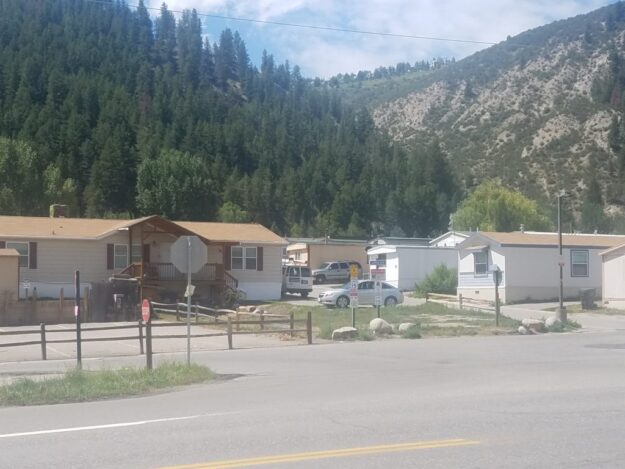Widgetized Section
Go to Admin » Appearance » Widgets » and move Gabfire Widget: Social into that MastheadOverlay zone
Roberts touts ‘very exciting’ bipartisan plan to use federal funds for housing, behavioral health

A few of the solutions state lawmakers propose to address Colorado’s twin crises — affordable housing and behavioral health — include adding beds at the state hospital, integrating mental and physical care, providing grants and loans for developers, and helping mobile home residents stay housed.
It’s all part of a bipartisan plan to funnel hundreds of millions in federal COVID-19 relief dollars into behavioral health and affordable housing.
Legislators plan to allocate $850 million that Congress sent to Colorado through the American Rescue Plan Act, passed last spring. State lawmakers held a news conference Wednesday to introduce four bills that would spend parts of the money. A handful of other bills were introduced last week, and more are still to come. The legislation is based on recommendations from two task forces that met last fall and wrapped up most of their work by the start of the legislative session in January.

“This is a very exciting afternoon,” Rep. Dylan Roberts, an Avon Democrat who chaired the Affordable Housing Transformational Task Force, said Wednesday. “This comes after months and months of work through the task forces.”
Affordable housing grants for nonprofits and local governments
Roberts and Mary Bradfield, a Colorado Springs Republican, introduced a bill Wednesday that would put $178 million of the federal money toward grants to help nonprofits and local governments add affordable housing and provide cash assistance for people struggling to afford rent. The bill’s Senate sponsors are Sens. Julie Gonzales and James Coleman, both Democrats from Denver.
“Our housing capacity is not keeping pace with our housing needs,” Coleman said at the news conference. The bill would “make critical investments to uplift the work of nonprofits and local governments across the state,” which lawmakers recognize as knowing their communities’ unique needs, he added.
Helping mobile home residents
Sen. Nick Hinrichsen, a Democrat from Pueblo, highlighted another housing bill. It would aim to protect mobile home residents who can face displacement when a development changes hands, or when landlords spike the cost of renting the land where their properties sit. The bill would designate $35 million toward existing programs to help empower mobile home owners and enable them to buy their communities, Hinrichsen said at the news conference.
The bill’s other sponsors are Gonzales and Reps. Andrew Boesenecker, a Fort Collins Democrat, and Mandy Lindsay, an Aurora Democrat.
Revolving loan funds for housing development
Sens. Jeff Bridges, a Greenwood Village Democrat, and Rachel Zenzinger, an Arvada Democrat, are bringing a bill that would put $150 million toward revolving loan funds for affordable housing, along with House sponsors Reps. David Ortiz, a Littleton Democrat, and Perry Will, a Republican from New Castle. One fund would provide low-interest or “below market” loans to affordable housing developers, helping them build apartments or for-sale homes in communities where the pandemic significantly impacted the housing market. Another fund would provide loans for the purchase of existing affordable apartments and homes, by entities looking to keep those units affordable.
Though the federal money from the American Rescue Plan Act is for one-time purposes, this bill would allow some of the money to get recycled and used again for new projects.
The bill would put home ownership “back within reach for our seniors, our young professionals, new families, disabled veterans, and many, many more,” Ortiz said.
Will said the bill would help create new housing for the teachers, nurses and first responders who live in his district in northwest Colorado. “This revolving fund will be self-sustaining over time, which is great,” he said. “It’ll build thousands of homes and bring good jobs.”
Affordable housing bills introduced last week would provide funds for innovative housing solutions and help “middle-income” workers access housing.
Integration of primary care with behavioral health care
Will is also working with Rep. Chris Kennedy, a Lakewood Democrat, along with Sens. Sonya Jaquez Lewis, a Boulder County Democrat, and Kevin Priola, a Republican from Henderson, on a bill that would invest $35 million into better integrating physical health care with treatment for mental illness and substance use disorders, by providing grants to primary care practices. This was one of the recommendations that came out of the Behavioral Health Transformational Task Force.
Mental Health America’s 2022 State of Mental Health in America report, which used data from 2018-2019, ranked Colorado in last place overall for adult mental health.
“We all know that Colorado’s behavioral health system needs work, which is why I’m proud to sponsor this important legislation,” Jaquez Lewis said. “This bill will help us get more people that will give us that critical help that we need.”
“Mental health is nonpartisan, so it’s a true bipartisan effort, and we’re working together,” Will pointed out. “Mental illness doesn’t care if you’re a Republican or Democrat.”
Adding treatment beds for people with behavioral health needs
At Wednesday’s news conference, Rep. Judy Amabile, a Boulder Democrat, spoke about her adult son, who “has cycled in and out of short-term hospital stays. He has been homeless, and he has been involved in the criminal justice system.”
“And it’s not just him,” she added. “It is thousands of Coloradans” with unmet behavioral health needs.
Amabile is sponsoring a bill with Sens. Faith Winter, a Westminster Democrat, and Jim Smallwood, a Parker Republican, to add 16 beds at the Colorado Mental Health Institute at Fort Logan for people who are experiencing psychosis and serious mental illness. The bill would also create 125 new “step-down beds” where people can stay after leaving the emergency room.
Additional bills introduced last week would provide funding for other behavioral health task force priorities, including grants for local agencies and intensive care.
Editor’s note: This story first appeared on Colorado Newsline, which is part of States Newsroom, a network of news bureaus supported by grants and a coalition of donors as a 501c(3) public charity. Colorado Newsline maintains editorial independence. Contact Editor Quentin Young for questions: info@coloradonewsline.com. Follow Colorado Newsline on Facebook and Twitter.
Faith Miller
Latest posts by Faith Miller (see all)
- Eagle County first to try to use new state law to ask voters for lodging tax to fund housing, child care - July 17, 2022
- Roberts, Solomon SD8 race seen as critical to Republicans regaining control of state Senate - July 5, 2022
- Colorado taxpayers likely to see much higher refunds than originally forecast, officials say - June 21, 2022


